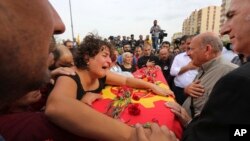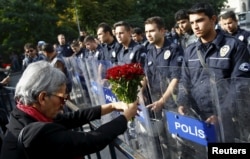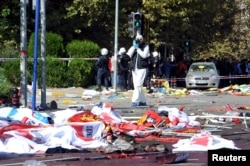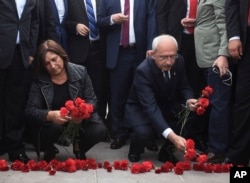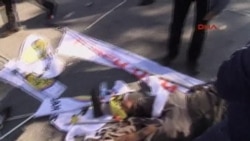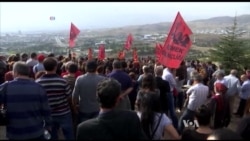Thousands of people took to the streets of Ankara Sunday, many of them chanting slogans against the Turkish government, as the country mourned the victims of twin bombings at a peace rally that killed at least 95 people.
The government reported that 160 people injured in the twin blasts were still hospitalized, with 65 of them in intensive care at 19 hospitals. Turkey's pro-Kurdish Peoples' Democratic Party put the death toll at 128, but the government did not confirm this figure.
Investigation focusing on IS
No one has claimed responsibility for the attacks, but Reuters quoted two senior Turkish security sources as saying the initial investigation is focusing on the Islamic State. The officials said the attacks bore striking similarities to a suicide bombing in July in Suruc near the Syrian border that was also blamed on Islamic State insurgents.
WATCH: Bombings a Sign of Turkey’s Deep Troubles (Luis Ramirez)
Selahattin Demirtas, the co-chairman of Turkey's pro-Kurdish party, blamed the government for the explosions. "The state which gets information about the bird that flies and every flap of its wing," he told mourners, "was not able to prevent a massacre in the heart of Ankara."
The Hurriyet daily headline called the attack "A bomb into our hearts." It added, "The deeply outraged public is waiting to find out who is behind the incident."
Prime Minister Ahmet Davutoglu declared three days of national mourning.
Some of the crowd in Ankara assembled near the scene of Saturday's bombings left flowers for the victims after initially being blocked by the heavy police presence.
The blasts occurred near the main exit of the railway station in the Ulus district. That location was presumably intended to cause a high number of deaths among participants at the rally, which was organized by labor and civil society groups.
There was chaos and confusion at the scene of the bombings, where bodies lay strewn on the ground along with clothing and yellow flags of the pro-Kurdish People’s Democratic Party (HDP).
'Heinous attack'
Turkish President Recep Tayyip Erdoğan condemned the blasts as a "heinous attack on our unity and our country's peace." He canceled his next three days of appointments to focus on the security challenge to Turkey.
U.S. President Barack Obama offered Turkey official U.S. condolences. A White House statement said Obama also conveyed "his deepest personal sympathies," and sought to extend assurances that "Americans stand in solidarity with the people of Turkey in the fight against terrorism."
Davutoglu said the country should unite and act against terrorism, saying there are indications two suicide bombers carried out the blasts.
Trading accusations on social media
But the prime minister’s appeal for calm and unity fell on deaf ears. Lawmakers from the ruling AKP political party took to Twitter and other social media sites to denounce the Kurds and to claim the bombing was the conspiratorial handiwork of Kurdish separatists, a “provocation” designed to make the government look bad. Others accused the pro-Kurdish HDP party of bombing their own supporters in an effort to boost its electoral appeal.
PKK sympathizers along with right-wing politicians accused the AKP or the intelligence services of being responsible, in a bid to whip up pre-election fever ahead of the November elections.
Lutfu Turkkan, a nationalist lawmaker wrote on Twitter that the Ankara attack “was either a failure by the intelligence service, or it was done by the intelligence service.”
None of the accusers came up with any fact-based evidence for their claims — not a standard requirement in Turkish politics, which thrives on conspiracy theories. But the failure of the government to get to the bottom of a string of bombings in southern Turkey the past three years hasn't helped to stop speculation about who might be behind the terrorism, analysts said.
The United States condemned what it called a "horrific terrorist attack." In a statement, National Security Council spokesman Ned Price said the fact that the attack occurred ahead of a planned peace rally "underscores the depravity behind it and serves as another reminder of the need to confront shared security challenges in the region."
Demirtaş compared Saturday's attack to two bombings earlier this year that struck in the mainly Kurdish towns of Diyarbakır and Suruç in southeast Turkey. “We are witnessing a huge massacre," Demirtas said. "An atrocious and barbarian attack was carried out.”
Islamic State extremists said they were responsible for the explosion in Suruç in July, which killed 33 people. It triggered clashes between Turkish forces and IS militants, with Turkish soldiers and jihadists engaging in cross-border exchanges of gunfire and shelling near the Turkish border town of Kilis.
Cease-fire
The PKK announced after the bombings Saturday that it is ordering its fighters to curb militant activities in Turkey and only respond when they come under attack from Turkish forces. But Turkey said its warplanes struck Kurdish targets in northern Iraq and southeastern Turkey on Saturday and Sunday, killing 30 or more Kurdish fighters.
The Turkish government used the Suruç bombing to justify launching airstrikes against Kurdish militant positions in northern Iraq and Syria, arguing it needed to combat all terrorist groups, Kurdish and Islamic. The airstrikes ended a four-year-long peace process between the PKK and Ankara.
Coming just weeks away from next month’s parliamentary elections, Saturday’s bombings will likely add to a sense of foreboding across a country fearful of more spillover from the war raging in neighboring Syria and the clashes in southeast Turkey between Turkish forces and PKK militants.
Saturday’s blasts were several minutes apart; the first went off at 10 a.m., the local Dogan news agency reported. A video posted on social media captured one explosion that enveloped young marchers dancing and waving banners. Other video footage showed bodies lying on the ground and survivors trying to help the wounded.
WATCH: Raw video from the scene
Anger Simmers As Turks Begin to Bury Blast Victims
Dorian Jones contributed to this report from Istanbul. Ken Bredemeier also contributed from Washington.




